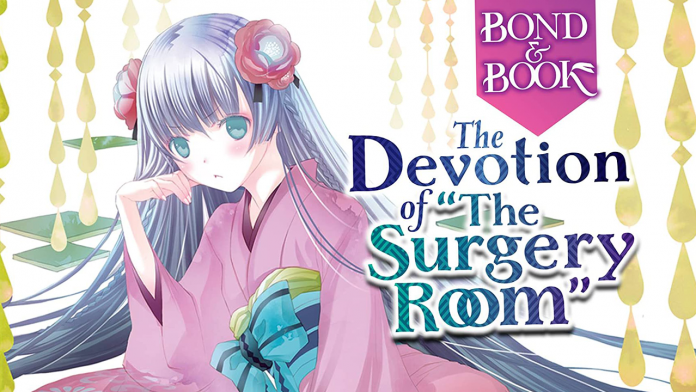Bond and Book: The Devotion of “The Surgery Room” by Mizuki Nomura is an episodic short story collection with a strange premise. Its protagonist, a teenage boy named Musubu, can talk to books. When he browses through libraries and bookstores, he hears the voices of countless books calling him. The books yearn for someone to read and understand them. And even though no one else can hear them, the books are also constant witnesses to goings-on around them. So Musubu uses his powers to solve mysteries and problems that his book friends draw his attention to.
One of the best parts of Bond and Book is its frequent intertextuality with classic literature. The plots and meanings of other books are integral to several of the stories, and includes a good mix of literature from various countries. There’s bound to be some references in there for everyone. For instance, the collection’s title story is about a romantic tragedy by Japanese writer Kyōka Izumi. However, the first tale centers on the Swedish children’s series Pippi Longstocking. It’s always fun to see how the characters interact with the literature that means something to them, and how it affects their lives.
Unfortunately, the human characters take a sideline to the parts about books. By the end of the anthology, I still had a lot of questions about the backgrounds and motivations of Musubu and his best friend Haruto. And I was also disappointed some characters ended up playing relatively small roles. The notes at the end say Bond and Book takes place in the same universe as another series by the same author, Book Girl, so maybe more answers are there. But it’s too bad this novel doesn’t stand alone as well as it could have.
Also upsetting is the lack of resolution regarding Musubu’s relationship with Princess Yonaga, a book he calls his girlfriend. It seems clear from her introduction that Yonaga is abusive. She gets obsessively jealous of other women (and books) and frequently threatens Musubu’s wellbeing for minor things she considers “cheating.” But by the end, Musubu still puts up with the princess’s cruel treatment without question. I was hoping the writer would do more than simply throw in a “yandere” type character without interrogating the trope at all.
Yet despite those issues, I still loved Bond and Book‘s overall themes. It covers the subjectivity of literary analysis, and the emotional importance that literature can hold. One great example comes when a younger boy struggling with issues of self-worth reads a story that seems to confirm his pessimistic beliefs, and it adds to his depression. But Musubu consoles him with a different interpretation of the story, urging him to read it again while looking at it as hopeful instead. Neither Musubu nor the other characters ever argue that one interpretation is more or less correct than another. Instead, they emphasize how the same story can have completely different, deeply personal meanings to different people. That’s part of what makes literature so important, and it’s something I feel strongly about as well.
Along the same lines, anyone who reads Bond and Book might disagree with my criticisms and enjoy it more! While some aspects could be improved, I was drawn in by what it had to say about the relationships readers can form with their favorite books. I’d recommend it to book lovers (like Musubu) interested in how literature can impact lives. Give it a chance, and maybe you’ll form a relationship as deep as the other passionate readers Musubu helps.
Bond and Book: The Devotion of “The Surgery Room” is available now on Amazon in both digital and hardcover versions.
Title: Bond and Book: The Devotion of “The Surgery Room”
Publisher: Yen Press
Release Date: September 14, 2021
Type: Light Novel
Author: Mizuki Nomura
Illustrator: Miho Takeoka
Translator: Nicole Wilder






